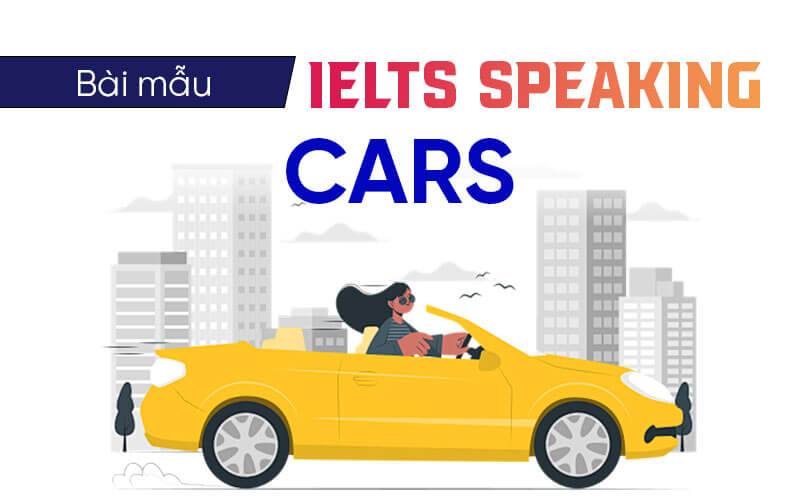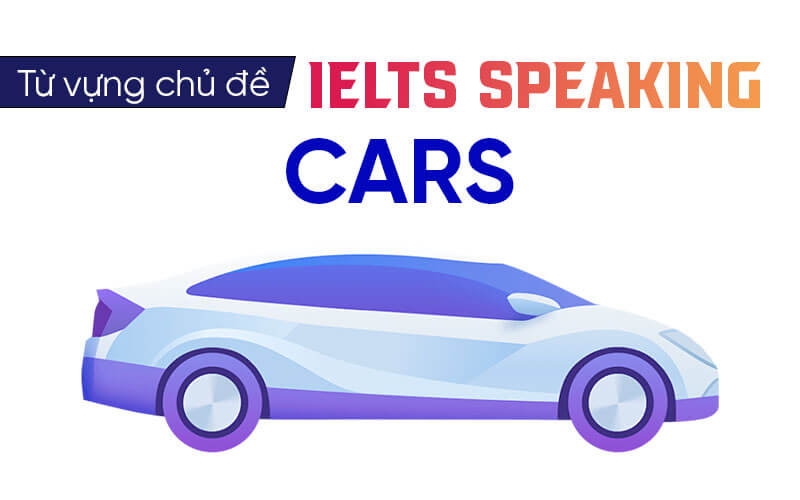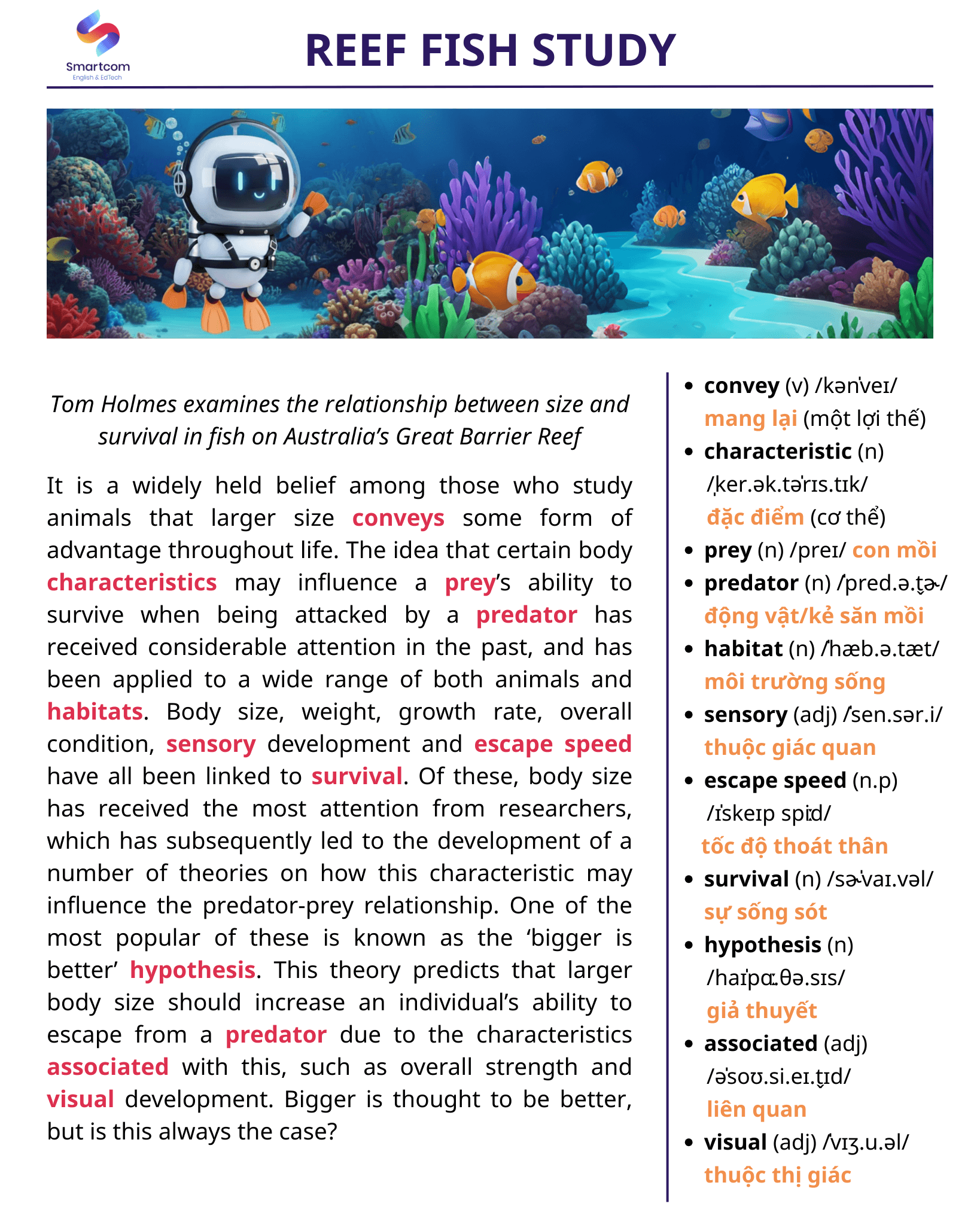Đội ngũ chuyên gia tại Smartcom English là tập hợp những chuyên gia đầu ngành trong lĩnh vực IELTS nói riêng và tiếng Anh nói chung. Với phương pháp giảng dạy sáng tạo, kết hợp với công nghệ AI, chúng tôi mang đến những trải nghiệm học tập độc đáo và hiệu quả. Mục tiêu lớn nhất của Smartcom Team là xây dựng một thế hệ trẻ tự tin, làm chủ ngôn ngữ và sẵn sàng vươn ra thế giới.
Bạn đang bối rối khi không biết mình cần nói những thông tin gì khi gặp phải phần thi IELTS Speaking Cars? Bạn có thể sắp xếp thông tin nhưng lại không biết những thông tin định nói nên dùng từ vựng hay cấu trúc nào?
Nếu hiện tại bạn đang có những câu hỏi như rất nhiều thí sinh ngoài kia vậy thì hãy bắt đầu ngay với bài viết dưới đây của Smartcom English. Bài viết này là nơi sẽ giúp bạn giải đáp những thắc mắc của bạn về chủ đề Ielts Speaking Cars một cách chi tiết và cụ thể nhất.

Bài mẫu IELTS Speaking Cars Part 1
Ở phần thi này, các câu hỏi thường khá đơn giản, nhưng cách bạn sử dụng từ vựng cũng như ngữ điệu trong khi nói sẽ là thứ giúp bạn đạt được số điểm cao trong phần thi này. Việc chuẩn bị bằng cách đọc một số câu trả lời mẫu dưới đây sẽ giúp bạn có nền tảng vững chắc hơn khi gặp phải chủ đề Cars trong phần thi Ielts speaking của mình.
Câu hỏi và trả lời mẫu
1. Do you like cars?
Yes, I do! I’m really interested in cars because they are not just a means of transportation but also a symbol of technology and design. I love learning about different car brands, their features, and how they improve over time.
2. Do you prefer driving or being a passenger?
I think I prefer being a passenger, especially on long trips. It allows me to relax, enjoy the scenery, and even take a nap if I feel tired. However, driving can be fun too, especially when the road is clear and the weather is nice.
3. What kind of cars do you like?
I personally like SUVs because they are spacious, comfortable, and suitable for both city driving and road trips. Besides, they often have advanced safety features, which make them a great choice for families.
4. Is it important to own a car in your country?
It depends. In big cities like Hanoi, owning a car is not really necessary because public transportation is available, and traffic congestion is a serious problem. However, in rural areas, having a car can be very convenient, especially for traveling long distances.
5. What are the advantages of having a car?
Having a car gives you freedom and convenience. You don’t have to rely on public transport schedules, and you can travel comfortably anytime you want. It’s also useful for emergencies or when you need to carry heavy things.
6. Do you think cars will still be popular in the future?
Yes, but I think electric cars will become more popular. As people become more aware of environmental issues, traditional gasoline cars may be replaced by eco-friendly options like electric or hydrogen-powered vehicles.

Bài mẫu IELTS Speaking Cars Part 2
Dưới đây là mẫu câu trả lời cho một dạng bài Ielts Speaking part 2 chủ đề “Cars” mà bạn có thể gặp phải.
Describe a car journey you remember well
You should say:
- Where you went
- Who you went with
- What you did during the journey
- And explain why you remember it well.
Sample Answer:
One of the most memorable car journeys I have ever had was a trip to Ninh Bình with my friends last summer. We decided to take a road trip instead of traveling by bus because we wanted more freedom to explore different places along the way.
There were four of us in the car, and one of my friends was the driver. We started early in the morning from Hanoi, and the journey took about two hours. During the trip, we played music, sang along, and had some great conversations. The weather was perfect that day—sunny but not too hot, which made the ride even more enjoyable.
Once we arrived in Ninh Bình, we visited some famous places like Trang An and Hang Múa, where we hiked to the top of the mountain to enjoy the breathtaking view. We also had a delicious meal at a local restaurant, trying specialties like goat meat and burnt rice.
I remember this journey so well because it was full of laughter and fun. It was also the first time I had taken a road trip with friends, which made it even more special. Plus, the scenery along the way was absolutely stunning, with endless rice fields and limestone mountains.
Overall, this car journey was an unforgettable experience, and I would love to do it again in the future.
Bài mẫu IELTS Speaking Cars Part 3
Câu hỏi và trả lời mẫu
1. How has car ownership changed in your country over the years?
Car ownership in my country has increased significantly in the past decade. In the past, only wealthy families could afford a car, but now, with the rise of the middle class and more affordable car models, many people can buy one. However, this has also led to problems like traffic congestion and air pollution, especially in big cities like Hanoi and Ho Chi Minh City.
2. What are the advantages and disadvantages of owning a car?
Owning a car has many advantages. First, it provides convenience and flexibility since you don’t have to depend on public transport schedules. It’s also useful for long-distance travel and emergencies. However, there are also some drawbacks. Cars are expensive to maintain, and fuel prices can be quite high. Plus, in crowded cities, finding a parking space can be a real challenge.
3. How do you think cars will change in the future?
I believe cars will become more eco-friendly in the future. With concerns about climate change, electric and hydrogen-powered cars will likely replace traditional gasoline cars. Also, we might see more self-driving cars that use artificial intelligence to improve safety and convenience. These advancements could make transportation more efficient and reduce pollution.
4. Do you think governments should encourage people to use public transport instead of cars?
Yes, definitely. Governments should promote public transportation to reduce traffic congestion and pollution. They can do this by improving bus and train services, making them more affordable and reliable. In addition, policies like higher taxes on cars or restrictions on private vehicles in city centers could also encourage people to use public transport more often.
5. How do people’s attitudes toward cars differ in rural and urban areas?
In urban areas, cars are often seen as a luxury rather than a necessity because people have access to buses, taxis, and even metro systems. Many city dwellers also prefer motorbikes because they are more convenient in heavy traffic. However, in rural areas, cars are more essential since public transportation is limited, and people often have to travel long distances.
Xem thêm: IELTS Speaking Lost And Found
Từ vựng chủ đề IELTS Speaking Cars
Dưới đây là các từ vựng mà bạn có thể sử dụng để làm phong phú hơn cho phần thi Ielts Speaking của mình với chủ đề Cars.
- Fuel-efficient (tiết kiệm nhiên liệu)
- High-performance (hiệu suất cao)
- Cutting-edge technology (công nghệ tiên tiến)
- Traffic congestion (tình trạng ùn tắc giao thông)
- Autopilot (chế độ lái tự động)
- Environmentally friendly (thân thiện với môi trường)
- Public transport (giao thông công cộng)
- Self-driving car (xe tự lái)
- Maintenance cost (chi phí bảo dưỡng)
- Driving experience (trải nghiệm lái xe)

Kết bài
Việc chuẩn bị kỹ lưỡng từ vựng cũng như các cách truyền tải thông tin về chủ đề này không những giúp bạn dễ dàng đạt được số điểm mong muốn cho phần thi IELTS Speaking của mình mà còn có thể giúp bạn giao tiếp tốt hơn về chủ đề này, một chủ đề vô cùng gần gũi trong cuộc sống.
Bạn đang bế tắc với câu hỏi “học IELTS ở đâu?” hay “Chi phí học IELTS là bao nhiêu?” và muốn có cho mình một số điểm IELTS ổn thoả để có thể vào được ngôi trường mà mình mơ ước? Đừng lo! Smartcom English sẽ là nơi cung cấp cho bạn đầy đủ những hành trang cần thiết giúp bạn dễ dàng hơn trên con đường chinh phục ước mơ đó của mình.
Kết nối với mình qua


![[PDF + Audio] Tải Sách IELTS Cambridge 19 (Kèm đáp án)](https://smartcom.vn/blog/wp-content/uploads/2024/06/ielts-cambridge-19_optimized.png)


![[PDF + Audio] Tải Sách IELTS Cambridge 17 (Kèm đáp án)](https://smartcom.vn/blog/wp-content/uploads/2024/07/sach-ielts-cambridge-17_optimized.jpg)

![[PDF + Audio] Tải Sách IELTS Cambridge 15 (Kèm đáp án)](https://smartcom.vn/blog/wp-content/uploads/2024/07/ielts-cambridge-15_optimized.jpg)








